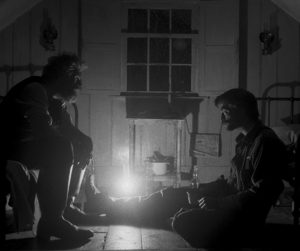A dark and twisted fever dream of a film, THE LIGHTHOUSE confronts the anguish of the human condition with suitable horror and an equally suitable dash of absurdity. Rendered in disturbing grades of black and white, it presents two men tending a lighthouse on a desolate rocky outcropping in the middle of nowhere. In the course of the running time, they will, of course, go mad from the isolation and deathly ennui that pits them not only against each other, but also against themselves. Not to mention a pugnacious seagull and the putative enchantments of the island, including an anatomically correct mermaid.

Robert Pattinson, Willem Dafoe
The two men are Tom (Willem Dafoe), a loquacious seasoned salt forced onto (semi) dry land because of a leg injury, and Ephraim (Robert Pattinson), a taciturn drifter serving an apprenticeship in his new trade. Theirs is a contentious relationship from the start, with the neophyte stickling for the rules, and his supervisor cheerfully ignoring them when it suits his mood. Ephraim is conscientious in his duties of polishing brass, swabbing floors, and otherwise doing the housekeeping while Tom spends the long nights in the lantern, staring with an erotically charged delight directly into the lenses that create the lighthouse’s warning beacon. What he sees, we never find, out, but the wanderings of Ephraim’s mind are set forth in savage detail, including that mermaid (Valeriia Karaman) who may be the product of the scrimshaw fetish to which the younger man pleasures himself, or not. It hardly matters. Reality itself becomes an artificial construct as his mental health deteriorates and Tom’s capricious commands grate on his soul, as does the veritable symphony of bodily sounds and emissions constantly emanating from the older man. The tensions lead to drunken brawls and fraternal reconciliations as arbitrary as Tom’s management style, both of which are charged with a palpable homoreroticism.
This is a mood piece rather than a conventional narrative, and as such it is viscerally effective. The tedium of Ephraim’s daily routine is as horrifying as what he finds in the lobster trap. Pattinson’s face, as his character slips into psychosis, becomes a fungible landscape twisted into anguish or rapture. Yet it’s the cold-eyed calm that is the most arresting. With a blank canvas such as that, there is the suspense of what synaptic storms are brewing, and what form they will take when they erupt. As for Dafoe, his craggy face topped with hair in a perpetual stormy state of undulating locks that bristle with righteousness and alarm, brings down the wrath of ancient marine deities as well as the Christian ones. He is an Old Testament prophet, wild-eyed with his crazed eloquence and the fervor of outraged nature herself. The craggy face topped with hair in a perpetual stormy state of undulating locks that bristle with righteousness and alarm.

Dafoe, Pattinson
The whole is filmed with an overexposure that makes daylight a pale and sickly thing, while the artificial light of the lanterns and the lighthouse lamp itself is aggressive, filling up the screen with more than a seemly allotment of space, while also relegating the mere humans to the half-light where they scurry and spar over trivialities and sins in inky shadows that seem half-ashamed to cover them. When Tom screams “I am the light!”, it has the tinge of aspirational despair as well as madness.
THE LIGHTHOUSE as an expressionistic etude, rife with the effluvia of body and mind, both of which spill with wild abandon. Divinely grotesque in conception and execution, it staggers the mind even as it expertly unsettles it.
This movie is all about ZEUS and Prometheus who gave fire to humans and was forced by Zeus to be chained to a cliff and having birds eat him alive every day – great way they included the light keeper to go off on greek gods and what can happen
GREAT FLICK